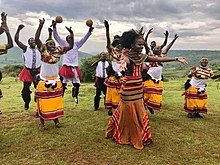 Baganda traditional dance | |
| Total population | |
|---|---|
| 5,555,319[1][2] | |
| Regions with significant populations | |
| Languages | |
| Luganda, English | |
| Religion | |
| Christianity, African Traditional Religion, Islam | |
| Related ethnic groups | |
| Basoga, Bagwere and other Bantu peoples |
| Ganda | |
|---|---|
| Person | OmuGanda |
| People | AbaGanda |
| Language | OluGanda |
| Country | BuGanda |
The Baganda[3] (endonym: Baganda; singular Muganda) also called Waganda, are a Bantu ethnic group native to Buganda, a subnational kingdom within Uganda. Traditionally composed of 52 clans (although since a 1993 survey, only 46 are officially recognised), the Baganda are the largest people of the Bantu ethnic group in Uganda, comprising 16.5 percent of the population at the time of the 2014 census.[2][1][4]
Sometimes described as "The King's Men" because of the importance of the king, or Kabaka, in their society,[5] the Ganda number an estimated 5.56 million people in Uganda.[2][5] In addition, there is a significant diaspora abroad, with organised communities in Canada, South Africa, Sweden, the United Kingdom, and the United States.[6] Traditionally, they speak Luganda. According to the 2002 Census of Uganda, 42.7% of Baganda are Roman Catholic, 27.4% are Anglican (Church of Uganda), 23% are Muslim, and 4.3% are Pentecostal.[7]
- ^ a b "Uganda". World Directory of Minorities and Indigenous Peoples. Minority rights Group International. June 2019. Retrieved 23 June 2023.
- ^ a b c "2014 Uganda Population and Housing Census – Main Report" (PDF). Uganda Bureau of Statistics. Archived from the original (PDF) on 12 October 2017. Retrieved 17 April 2018.
- ^ "Ganda". Oxford English Dictionary (Online ed.). Oxford University Press. (Subscription or participating institution membership required.)
- ^ Zaragozà, Jordi Anglès. "BAGANDA PEOPLE". AFRICA 101 LAST TRIBES.
- ^ a b "Baganda". Countries and Their Cultures. Archived from the original on 29 July 2010. Retrieved 22 July 2010.
- ^ Mukasa E. Ssemakula. "Baganda in the Diaspora". The Buganda Home Page. Archived from the original on 19 August 2010. Retrieved 22 July 2010.
- ^ "Population Composition" (PDF). ubos.org. Retrieved 7 August 2023.